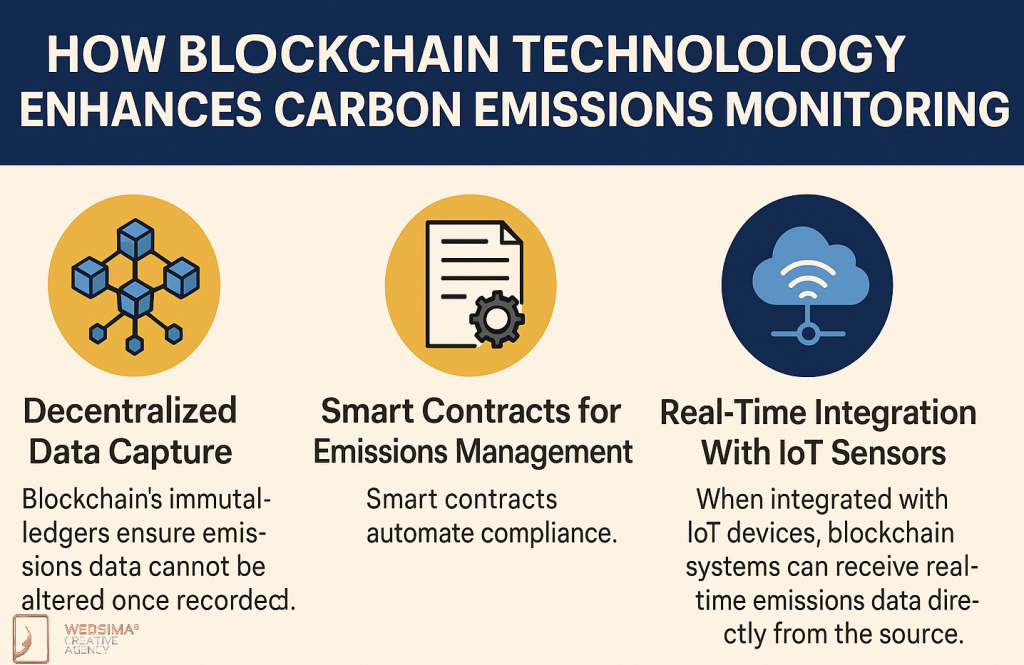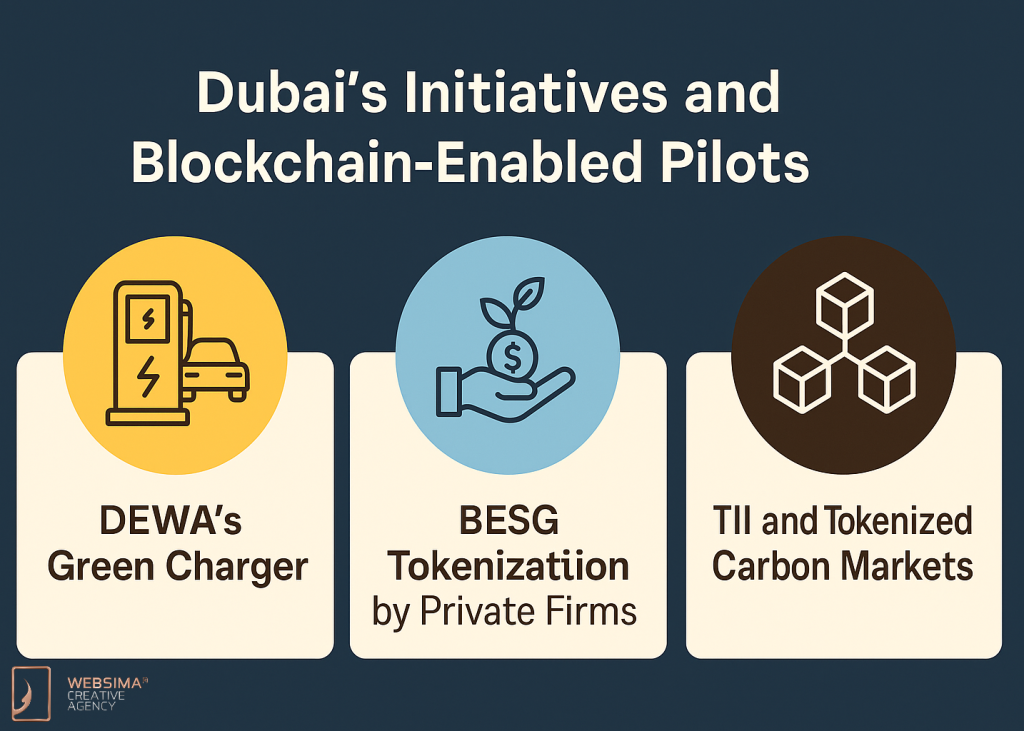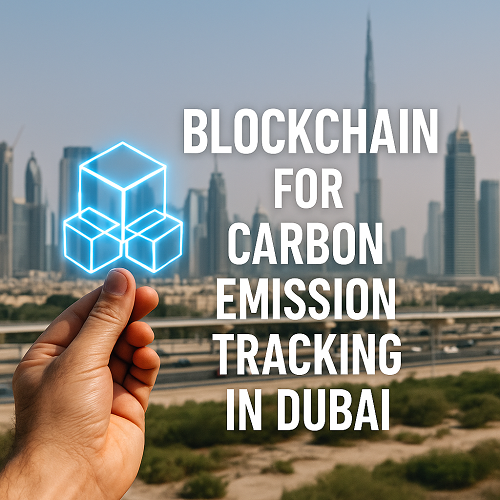Dubai is emerging as a global leader not only in blockchain adoption but also in sustainability innovation. As the city embraces its Net Zero 2050 goals, environmental accountability has moved to the forefront of policy, investment, and infrastructure development.
However, traditional carbon tracking systems often fall short in ensuring transparency, accuracy, and real-time data integrity. Blockchain technology—known for decentralization, immutability, and smart contract automation—offers a compelling solution. In this article, we explore how blockchain is transforming Dubai’s carbon emissions ecosystem, what initiatives are currently underway, and what lies ahead.
Introducing https://t.co/dyIk2hEoVc: The World’s First Proof-of-Energy Blockchain
Imagine a blockchain that doesn’t just consume energy — it generates it.
-> Tokens minted only when verified clean energy is produced
-> Validators stake real-world Renewable Energy Certificates… pic.twitter.com/5RaYiupLQK— D.Energy (@denergychain) May 6, 2025
Why Carbon Emissions Tracking Is Critical
Dubai’s Net Zero Goals
The UAE’s Net Zero by 2050 Strategic Initiative commits Dubai to reducing greenhouse gas (GHG) emissions by 31% by 2030. According to the UAE Ministry of Climate Change and Environment, this national policy aligns Dubai with global climate benchmarks and strengthens its commitment to sustainable development.
The Problem With Traditional Tracking Systems
Current emissions reporting is often fragmented, delayed, and vulnerable to manipulation. As ESG metrics become central to investor confidence and compliance, data integrity becomes non-negotiable. Manual inputs, disconnected platforms, and lack of transparency make these systems outdated in today’s digitized economy.
Blockchain in Carbon Emission Dubai Enhances Carbon Emissions Monitoring

Decentralized Data Capture
Blockchain’s immutable ledgers ensure emissions data cannot be altered once recorded. Each emission event—whether industrial, construction-related, or transportation-based—can be logged transparently, allowing regulators and auditors to trace every step.
Smart Contracts for Emissions Management
Smart contracts automate compliance. If emissions exceed certain thresholds, fines, penalties, or credit adjustments can be triggered instantly. This makes the enforcement of environmental policies more responsive and data-driven.
Real-Time Integration With IoT Sensors
When integrated with IoT devices, blockchain systems can receive real-time emissions data directly from the source. Factories, buildings, and transport fleets can have embedded sensors that send encrypted data to the blockchain, minimizing human error and fraud.
Dubai’s Initiatives and Blockchain-Enabled Pilots

DEWA’s Green Charger Blockchain
As a part of blockchain development in Dubai, DEWA (Dubai Electricity and Water Authority) uses blockchain to track electric vehicle energy usage that makes Dubai ideal for Blockchain as a Service (BaaS) companies. This system can be expanded to monitor avoided emissions across solar, wind, and sustainable energy use in both residential and commercial buildings.
TII and Tokenized Carbon Markets
The Technology Innovation Institute (TII) is developing blockchain platforms for carbon tracking and tokenization. These allow emissions reductions to be turned into digital assets that can be traded or retired in voluntary and regulatory carbon markets.
ESG Tokenization by Private Firms
The role of blockchain in Dubai’s ESG compliance is becoming significant, as Dubai’s blockchain startups are building platforms that tokenize verified carbon savings, allowing investors and companies to purchase or trade ESG-compliant digital certificates. This turns sustainability performance into a monetizable, investable asset.
Advantages of Blockchain Carbon Emissions Tracking in Dubai
| Feature | Impact |
| Immutable Recordkeeping | Prevents tampering and ensures transparency |
| Smart Contracts | Automates penalties, compliance, and incentives |
| Real-Time IoT Integration | Provides accurate, up-to-date emissions data |
| ESG Tokenization | Unlocks carbon credit trading and sustainability finance |
| Global Accessibility | Enables international validation and investor trust |
Regulatory Implications and Governance Considerations
Legal Recognition of Emissions Tokens
Dubai regulators must define how carbon credits recorded on blockchain are recognized under UAE law. This includes usage in compliance markets, green bonds, and international offset obligations.
Privacy and Data Security
Since emissions data may include operational or strategic insights, blockchain systems must include encryption, permission controls, and compliance with UAE data protection regulations.
Role of VARA and National Policies
Dubai’s Virtual Assets Regulatory Authority (VARA) may play a key role in overseeing the tokenization of carbon assets, ensuring environmental tokens follow similar governance frameworks to digital financial assets.
Integration With Smart Infrastructure and ESG Finance
Tokenized Green Building Compliance
Smart buildings in Dubai can log energy use, material sourcing, and waste management to a blockchain platform, creating an auditable sustainability trail. This enhances compliance with LEED, Estidama, and other green certification frameworks.
ESG Loans and Green Finance
Lenders can link financing terms to blockchain-verified emissions performance. Better emissions profiles mean better interest rates, creating tangible incentives for decarbonization in construction, manufacturing, and transport.
Transparent Supply Chain Reporting
Construction firms, logistics providers, and manufacturers can report lifecycle emissions at each phase—from materials to delivery—on blockchain platforms. This makes Scope 3 emissions easier to audit and report to stakeholders.
Challenges Ahead
Cost and Complexity
Full blockchain integration requires infrastructure, training, and initial investment. While long-term savings are clear, small and medium enterprises may face barriers without public-private support programs.
Lack of Standardization
Without standardized protocols for carbon asset creation and blockchain platforms, data silos and inconsistency can emerge. Dubai’s policymakers must lead efforts toward creating national blockchain carbon standards.
Education and Market Readiness
Mainstream industries still lag in Web3 literacy. Public campaigns, university courses, and corporate partnerships are essential for widespread blockchain adoption in environmental applications.
Future Outlook: Dubai as a Global Climate-Tech Hub
Carbon Credit Marketplaces
Dubai is well-positioned to host decentralized exchanges for trading certified emissions reductions. With transparent pricing and smart contract automation, it could become a global center for blockchain-based carbon markets.
ESG Leadership in the Region
As Gulf countries develop their own sustainability frameworks, Dubai’s blockchain carbon strategy can become a model for regional cooperation and compliance.
Incentive-Driven Green Economies
From tokenized emissions rebates to smart city sustainability scoring, blockchain can enable Dubai to implement incentive programs that reward emission reductions in real-time, creating a circular green economy.
Conclusion
Blockchain is reshaping how Dubai approaches carbon emissions tracking. It brings transparency, accountability, and automation to a system that has historically been opaque and inconsistent. As the emirate accelerates toward its Net Zero 2050 goals, blockchain will be essential to both public policy and private sector compliance.
What once required months of reporting, audits, and disputes are now executable in seconds—with full visibility and trust. Web3 is no longer experimental—it is Dubai’s strategic path forward in sustainability governance.
Partner With Websima to Build Dubai’s Green Future
At Websima, we build blockchain platforms that solve real environmental challenges. Whether you’re a sustainability officer, urban developer, logistics manager, or government agency—our solutions allow you to monitor, automate, and tokenize carbon performance in line with Dubai’s evolving climate goals.
Let’s build smarter systems that are transparent, auditable, and aligned with global ESG frameworks.
Contact Websima today to begin designing your blockchain-powered emissions platform.





